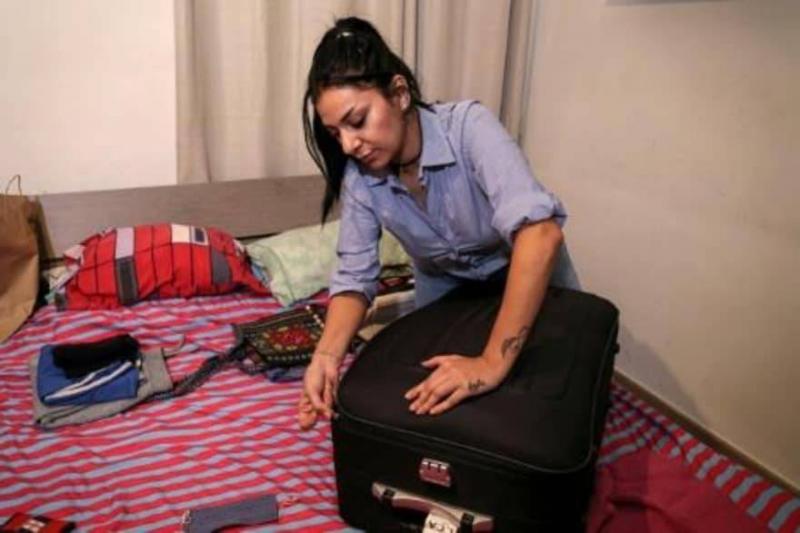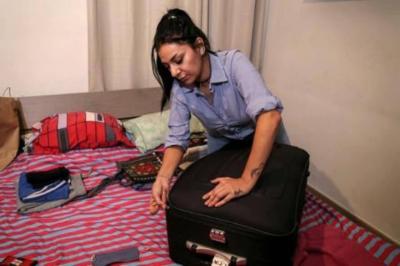In recent months, hundreds of Lebanese have flown the two hundred kilometers from their country to Cyprus, seeking temporary refuge from the dire crisis in Lebanon marked by electricity shortages, fuel and medicine scarcity, and a bleak outlook. After a much-anticipated flight lasting just 25 minutes, 30-year-old Lebanese national Nanour Abashian, along with her husband and two children, arrived at Larnaca Airport from Beirut, dragging seven bags, most of them large. She told AFP, "My pain is very great because I left my country and my family, but I am forced to do this because I want to raise my children in dignity and guarantee their future."
Lebanon has been experiencing a severe economic crisis for nearly two years, classified by the World Bank as among the worst in the world since 1850. Lebanese citizens are unable to withdraw their money from banks due to liquidity restrictions, with the Lebanese pound's value plummeting by over ninety percent, leading many to lose their jobs. Additionally, power outages occur for most hours of the day and night, and there is a lack of diesel fuel in the market for operating generators, affecting all aspects of life. The country is also facing shortages of medicine, bread, and other essential goods.
Thousands of Lebanese have left the country amid the crisis, with many choosing Cyprus, though AFP was unable to determine their exact number due to a lack of official statistics and some entering with non-Lebanese passports. However, the Lebanese ambassador in Cyprus, Claude Al-Haj, confirmed to AFP that since October 2019, when popular protests erupted in Lebanon against the political class, "we have noticed a significant increase in the number of family files opened at the embassy, and we recorded the largest increase after the August 4 explosion," at the Beirut port that resulted in over 200 deaths and 6,000 injuries, destroying large parts of the capital.
This is not the first time Lebanese have flocked to Cyprus. During the Civil War (1975-1990), many moved to the island and a large number returned home after the war ended. Al-Haj noted, "In the 1980s, there were one hundred thousand family files registered at the embassy." Also, during the July 2006 war between Israel and Lebanese Hezbollah, Cyprus served as a rear base for Lebanon. With Beirut Airport closed due to Israeli bombardment, evacuation ships departed from Beirut to take foreign nationals to the island before they headed to their home countries. They also transported Lebanese who lived in Cyprus temporarily while waiting for military operations to conclude.
AFP met with Nanour's family at their home north of Beirut two days before their journey to Cyprus. The young mother expressed regret as she packed her belongings, saying, "I decided to leave Lebanon because we no longer feel safe… we have become in the unknown, we are living in humiliation."
**Saving the School Year**
The family has temporarily moved into a friend's house in Larnaca awaiting the rental of an apartment near the school where her children are enrolled. Over the past weeks, dozens of families have rushed to register their children in schools. Lebanese national George Obeid had to enroll his three children in two different schools in Larnaca due to a lack of available spots in a single school. The man in his forties told AFP, "We do not see a future for the school year in Lebanon. Diesel is unavailable to run the generators, and teachers will not receive bonuses to be able to teach, nor will they be able to fill their cars with gasoline to get to schools..."
However, the family's struggle does not end here. George will not settle in Cyprus with his wife and children, as he works between Lebanon and Africa and will only visit them during weekends. AFP attempted to contact the school administration for inquiries but did not receive a response, as officials were busy preparing for an enormous influx of new students, deferring the school entry date for students registered after August 24. Lebanese and Cypriot officials spoke of more than 250 registration requests from Lebanese at the school.
**A Safe Haven**
While some families seek safety, education, and temporary stability in Cyprus, others have also found it a place for work and investment. Konstantinos Karaioyris, head of the Trade and Industry Department at the Ministry of Trade, stated that Cypriot authorities "launched a fast track for registering foreign companies last October," which garnered significant interest from Lebanese companies, with seven large and medium businesses in the information and communication technology sector registered so far, bringing along two hundred Lebanese employees. He anticipated this number would rise by the end of the year as many employee families would also relocate to the island.
The Lebanese ambassador remarked that "Cyprus helps Lebanese a lot," adding that under the fast-track mechanism for establishing companies, "the process now takes 10 to 15 days instead of two or three months as it used to in the past." Karaioyris believed this large influx of Lebanese companies would positively impact the Cypriot economy as "the employees of these companies generally spend their higher salaries in the Cypriot market," noting that "the most important benefit is the transfer of knowledge from foreign companies to local ones."
The real estate sector on the quiet Mediterranean island has also seen an uptick in demand for apartment purchases from Lebanese nationals. Lebanese businessman George Shahwan, owner of dozens of real estate projects in Cyprus, stated, "Our company sold 400 apartments to Lebanese families between 2016 and 2021, with one hundred of them in the last six months." He noted that Lebanese choose the EU member island for investment and stability because it offers several incentives, such as "granting permanent residency to anyone who buys a new property there, and Cypriot banks facilitate loan transactions for Lebanese with dollar incomes." Shahwan concluded, "Since 1975, Cyprus has been a safe haven for Lebanese," adding, "It is close and offers security and stability... They feel like they are in their second home."




